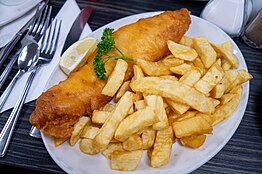
Back مطبخ بريطاني Arabic Britaniya mətbəxi AZ Gastronomia del Regne Unit Catalan Britská kuchyně Czech Britische Küche German Kuirarto de Britio EO Gastronomía del Reino Unido Spanish Erresuma Batuko gastronomia EU آشپزی بریتانیایی FA Brittiläinen keittiö Finnish


| British cuisine |
|---|
| National cuisines |
| Regional cuisines |
| Overseas/Fusion cuisine |
| People |
|
|
| Part of a series on the |
| Culture of the United Kingdom |
|---|
 |
British cuisine is the specific set of cooking traditions and practices associated with the United Kingdom, including the cuisines of England, Scotland, Wales and Northern Ireland. According to food writer Colin Spencer, historically, British cuisine meant "unfussy dishes made with quality local ingredients, matched with simple sauces to accentuate flavour, rather than disguise it".[1]
International recognition of British cuisine was historically limited to the full breakfast and the Christmas dinner; however, Celtic agriculture and animal breeding produced a wide variety of foodstuffs for indigenous Celts. Wine and words such as beef and mutton were brought to Britain by the Normans[2] while Anglo-Saxon England developed meat and savoury herb stewing techniques before the practice became common in Europe. The Norman conquest introduced exotic spices into Great Britain in the Middle Ages.
New foodstuffs have arrived over the millennia, from sausages in Roman times, and rice, sugar, oranges, and spices from Asia in the Middle Ages, to New World beans and potatoes in the Columbian exchange after 1492, and spicy curry sauces from India in the 18th and 19th centuries. Many vegetables seen today in British cuisine such as cabbage, peas, and cherries, were also brought as crops by the Romans.[3]
Traditional British dishes include full breakfast, roast dinner, fish and chips, toad in the hole and shepherd's pie. Traditional desserts include trifle, scones, apple pie, sticky toffee pudding and Victoria sponge cake. Cheddar cheese originated in the village of Cheddar in Somerset. Modern British cuisine is influenced by other cuisines and has in turn influenced the cuisines of cultures around the world.
The sandwich is named after its supposed inventor, John Montagu, 4th Earl of Sandwich.[4]
- ^ Spencer, Colin (2003). British Food: An Extraordinary Thousand Years of History. New York City: Columbia University Press.
- ^ Craig-Atkins, Elizabeth; Jervis, Ben; Cramp, Lucy; Hammann, Simon; Nederbragt, Alexandra J.; Nicholson, Elizabeth; Taylor, Allie Rae; Whelton, Helen; Madgwick, Richard (6 July 2020). "The dietary impact of the Norman Conquest: A multiproxy archaeological investigation of Oxford, UK". PLOS ONE. 15 (7): e0235005. Bibcode:2020PLoSO..1535005C. doi:10.1371/journal.pone.0235005. ISSN 1932-6203. PMC 7337355. PMID 32628680.
- ^ Lipkowitz, Ina (5 July 2011). Words to Eat By: Five Foods and the Culinary History of the English Language. Macmillan. ISBN 978-1-4299-8739-4.
- ^ "Sandwich celebrates 250th anniversary of the sandwich". BBC News. 9 May 2012. Retrieved 10 April 2024.